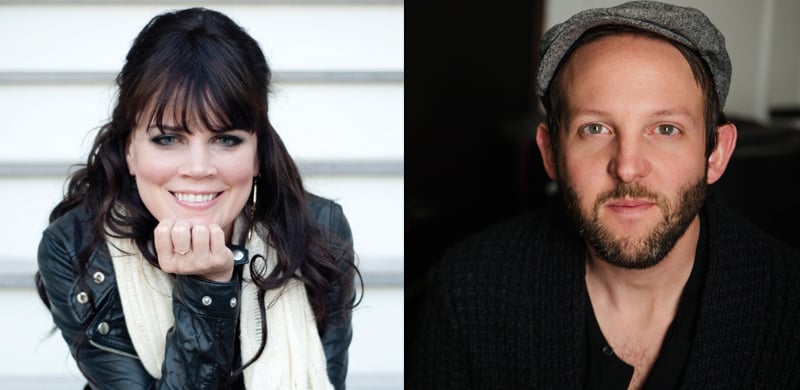
 Singer/songwriters Ginny Owens and Andrew Greer might be best known for their lyrics and melodies, but with the debut of their first book, Transcending Mysteries (Thomas Nelson), the two artists are quickly adding “esteemed author” to their résumé. Ginny and Andrew recently sat down to tell us more about the book and what they discovered about God (and themselves) through the writing process.
Singer/songwriters Ginny Owens and Andrew Greer might be best known for their lyrics and melodies, but with the debut of their first book, Transcending Mysteries (Thomas Nelson), the two artists are quickly adding “esteemed author” to their résumé. Ginny and Andrew recently sat down to tell us more about the book and what they discovered about God (and themselves) through the writing process.
You are both singer/songwriters and musicians. So why write a book?
Ginny: Writing a book has always been on my bucket list. I was particularly excited (and slightly terrified) by the opportunity to share beyond the 100 words that fit in a 3.5-minute song. Having the space to write in long-form my discoveries from Scripture and my personal story was a wonderful, humbling experience.
Andrew and I have been friends for years, since our days at Rocketown Records. Our friends at Thomas Nelson Publishers asked if we’d consider co-authoring a book. After several discussions over Mexican food, we decided to embark on the journey. We both wanted to discover more of God through Scripture and invite our friends (and readers) to discover with us.
Andrew: A book was definitely not an original part of my career plan! 50,000 words. Are you kidding me? I had been having conversations with a couple close friends who were struggling with spiritual doubts stemming from spiritual upbringings filled with legalism and control. As we talked through the things we don’t understand about God and about each other, we finally decided to stop taking our “Mom and Dad” issues out on God so that we could allow enough space in our relationship with Him to ask Him to reveal to us who He is. Rather than have who God is dictated to us, we wanted to discover who He is. This book is simply a dialogue with the reader, a conversation rather than a conclusion. We are here to probe the mystery with everyone else.
Why focus on the Old Testament? And what was one Old Testament character you discovered or rediscovered while writing Transcending Mysteries?
Ginny: I’ve always loved Psalms and Proverbs and have been part of group Bible studies of Old Testament books, but anytime I’ve attempted to dive in on my own, I’ve given up somewhere around Deuteronomy. The Old Testament is daunting, mysterious and confusing. Who is this God of Israel? Is He angry and impatient as some passages seem to suggest, or is He kind and loving like His son? We wanted to know, and so did our friends. We delved into these mysterious books to gain deeper insight into our mysterious, magnificent God and the people He loved. I became well-acquainted with characters I barely knew, like King Josiah, who brought the Israelites back to faith in God after years of rebellion. What I loved most, however, was rediscovering characters I thought I knew. Hannah, mother of the prophet Samuel, found true peace when she surrendered her deepest desires to God. And even as she did, she was unknowingly playing an incredible role in God’s plan for Israel. The lives of Old Testament characters were complex, and their journeys with God were complex, just like ours.
Andrew: The million dollar question! The tag line for the book reads: “We fell in love with Jesus, then we had to decide what to do with God.” As New Testament disciples of Christ, we are often fearful of the God of the Old Testament. The Old Testament was a major barrier in the spiritual conversations I was having with the friends I had mentioned before. We decided to take the challenge and open up the pages of the Old Testament to see what it reveals about the character of God, and is that character the same character we relate to today as 21st-century Christians? If God truly is the same yesterday, today and forever, then the decision to worship Him is a wise one. This is the conversation.
You guys are both transparent songwriters, but you really get honest with your life challenges in this book. How was sharing your vulnerability different in book format versus a 3.5-minute pop song?
Ginny: When I begin writing a song, I usually start by coming up with a “hook” – the line of melody and lyric which expresses the song’s theme and ties everything together. I then write the rest of the song around that “hook.” This was not the case when writing the book, however. Though I’d begin writing with a sense of where I wanted to go, I’d find that as I poured onto paper my own story and reflections from studying Scripture, new insights would emerge, sending the chapter in a different direction. The emerging insights challenged me to dig deeper into Scripture and into my own story. This approach to writing wasn’t what I expected, but it soon dawned on me this was the process of discovery. I learned it was impossible to know more of God until I laid aside my agenda, got honest about my own journey, and allowed Scripture to speak to me of who He is.
Andrew: There is a certain formula for writing songs, keeping thoughts and ideas within a small word count and timeframe to allow the message to be accessible to as many listeners, in as many places of life, as possible. But with 50,000 words versus three-and-a-half minutes, there are a lot of blank pages to fill, which means there is room for personal details that feel exposing and scary to share. Yet, through my experience with private and group therapy, and now through the experience of writing this book, I am certain that sharing our stories, both the good and the bad, is imperative in relating to ourselves, relating to each other and ultimately relating to God. Sharing vulnerably connects us as humans and helps remind us of why a redemptive relationship with God is so life-saving!
The chapters are titled after songs you have written. What is one of your most valuable tips for songwriters that has benefitted you through the years?
Ginny: Think of songwriting as a dear friend. The more time you spend together, the stronger and deeper your friendship will become. Show up as often as you can to meet your friend, songwriting. Spending 10-15 minutes a day creating melodies on your instrument or writing random thoughts in your journal will help you two stay connected. Then, when it’s time for a longer session, it won’t feel nearly as intimidating. I find this tip also helps with writer’s block. Continuing to show up has a profound, long-term effect on the songwriting process.
Andrew: Co-write! This goes along with the previous question. Sharing struggles with a fellow songwriter and attempting to set our hearts to music together, not only makes us better musicians and songwriters but it reminds us we are all human and in need of redemption, of an eternal hope through Jesus. Co-writing can turn into communion very quickly. What a cool opportunity for us to experience during our work day.
For more info, visit www.ginnyowens.com and www.andrew-greer.com.
##




